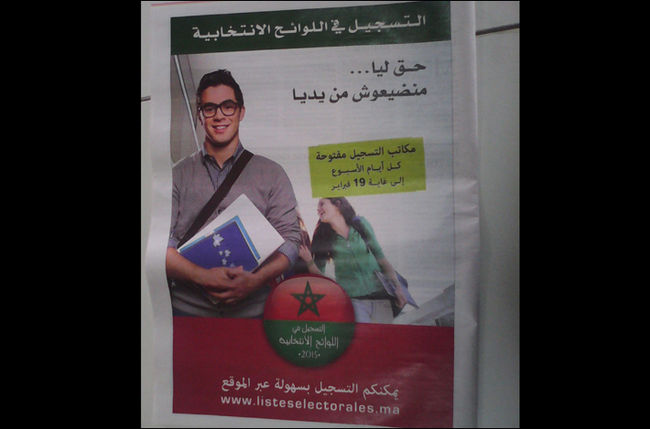By Hassan Benmehdi in Casablanca
for Magharebia

Morocco is pushing young people to get on electoral lists in time for the June local election [Magharebia/Hassan Benmehdi]
As Morocco prepares for local government elections, apathy among young voters is a big concern.
Interior Mohamed Hassad is doing everything possible to encourage citizens, and young people in particular, to vote in the June poll.
Figures released by his department show that only 7% of young people were registered to vote at the end of March 2014.
Students Hassan Elkouzi and his friend Yahia Benrachdoun are among the young Moroccans who do not plan to participate in the election.
“Registering to vote is a right, but as far as voting is concerned, I don’t think I will do that,” Hassan said.
Yahia said he had no reason to vote in the communal election. “The desired changes have been slow in coming,” he said.
For Safaa Mahdini, who belongs to the youth wing of the Party of Progress and Socialism (PPS), motivating young people to vote requires more than just encouragement from the authorities.
“Above all, political parties should give support and guidance to young people and explain to them the real issues surrounding elections, in terms of democracy, economic development and human rights,” she told Magharebia.
According to Ahmed J’mali, who works with young people living in shanty towns, there’s a reason why voter turnout among youth remains low.
“Young people, especially those living in suburban neighbourhoods and shanty towns, find themselves with no local representative who is listening to them and willing to talk to them about the projects and plans that have been announced, especially the ones that really matter to them,” he said.
A new study released earlier this month by the Abderrahim Bouabid Foundation confirms his point.
The study showed that 80.3% of respondents did not know the names of their local council leaders. The rate was 88% among people aged 18-24.
What is more, just 58.5% of respondents knew the date of the upcoming communal elections and only 22.5% knew that the next legislative elections were slated for 2016.
More than 80% said that they were not members or supporters of a political party. The rate was 90% among women and 91.5% among the unemployed.
”Voting is a process that must go beyond the ballot box,” political analyst Salim Elfkih suggested. “It has to address the most fundamental expectations of the public and at the end of every term of office, elected representatives have to be called to account,” he added.
Motivating citizens to cast their votes is more urgent than ever, according to journalist Ayyoub Cheikh.
“The stakes for the upcoming communal elections are high, because a low turnout could destroy the efforts made since 2011 to reconcile the public – especially young people, who showed a great appetite for change during the Arab Spring – with politics,” Cheikh said.







